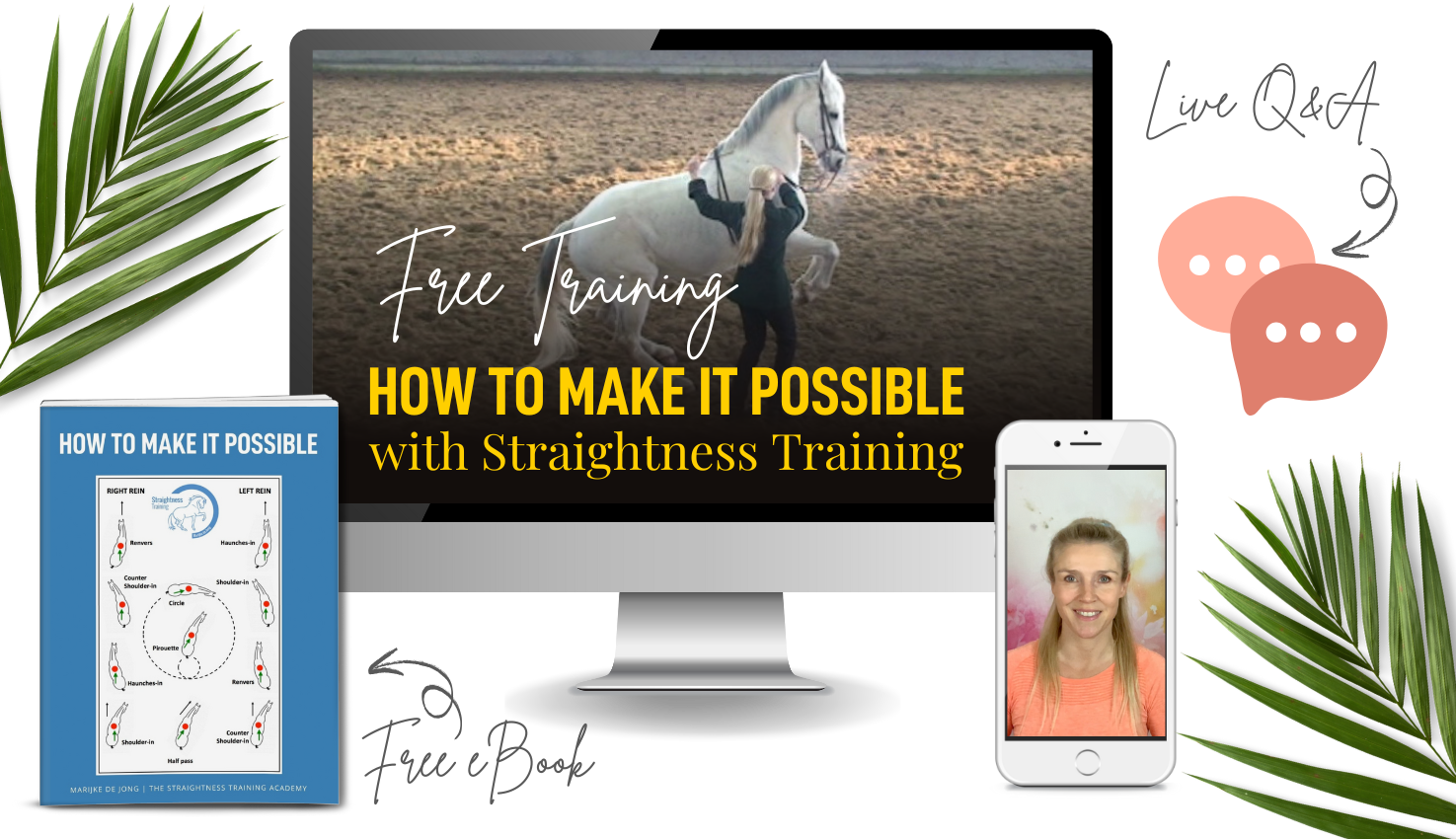- The 3 Stages of ‘New’ Things
- How to deal with stage 1 and 2?
- Tip #1: Acceptance
- Tip #2: Determine What Things Mean
- Tip #3: What Other People Think of You is None of your Business
- Tip #4: Keep Your Eyes On The Road
- Tip #5: Skip The Drama
- Tip #6: No Rent, No Room
- Tip #7: Feel Compassion
- Tip #8: Don’t Explain
- Tip #9: Don’t accept the gift
- Tip #10: It’s Your Party
- Tip #11: Do what makes you happy
- Tip #12: Together is better

12 Tips on How to Deal with Destructive Criticism
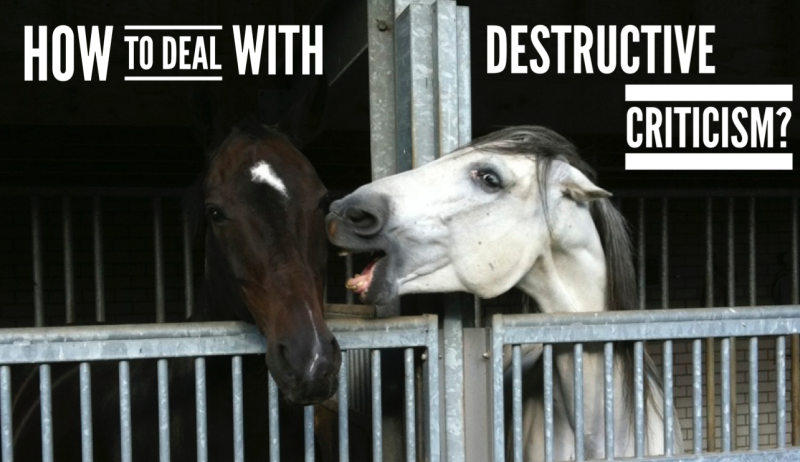
A lot of our STudents are the only one doing ST in the riding arena, or at their yard, or in their village, or even country.
That means, they are starting something ‘new’ in the arena, yard, village, country.
For example, groundwork with a horse is a bit unusual in the US.
And add to that: everything is done at a walk to start, so that’s double unusual.
Now what happens ‘new’ and ‘unusual’ things?
It goes through three stages.
The 3 Stages of ‘New’ Things
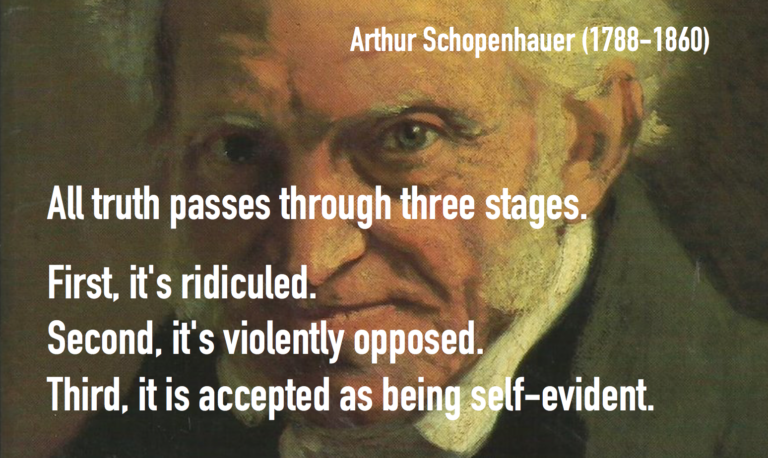
The German philosopher Arthur Schopenhauer (1788-1860) already said:
- First, it’s ridiculed.
- Second, it’s violently opposed.
- Third, it’s accepted as being self-evident.
So whenever we seek change, there are those who will ridicule it, and those who are opposed to it:
- A new idea can seem so ridiculous that people simply laugh.
- In the second stage, people begin to worry that it’s here to stay, so people will resist because they see it as a threat to everything they’re familiar with.
- In stage 3, we know the Earth is round. Then, people have no doubt about it.
But until things are in stage 3, we might be dealing with a fair amount of skepticism and criticism by others who are uninformed about ST.
And it’s not healthy, constructive criticism, which is something we all need to grow and improve.
Instead, it’s disempowering remarks such as:
- Oh, you only play with the horse?
- You don’t ride anymore, do you?’
- Are you still not riding your horse?
- How on earth do you think you will achieve something?
- The cavesson is a bad tool, why don’t you get a bit in his mouth!
- If you keep riding in a bareback pad I’ll have to come and fix your horse!
- When are you going to ride normally again?
- You need a proper saddle to improve your seat.
- You’ll never get your horse sound.
- You’re not a suitable rider for him and never get your confidence.
- Why don’t you sell your horse to someone who can really ride him and do dressage.
Well, this can be hard.
Some comments can be hurtful.
We might start to feel being riddled with self-doubt.
Ending up with a bunch of Gremlins.
So how to avoid this?
How to deal with stage 1 and 2?
What to do if we’re facing laughing people and strange looks?
What if you’re seen as an ST alien?
What to do if we’re facing ‘enemies’ because we’re perceived as a threat?
What to do if we are judged by people with a low level of consciousness?
Well, I am used to facing a lot of criticism during the many years I have been communicating about my ideas on training horses.
Both in clinics as on the internet and social media.
So I became quite experienced in dealing with criticism and opinions.
And this already inspired me some time ago to write some articles about it:
- The influence of rules >>
- ‘Agree to Disagree’ >>
- 8 Levels of Consciousness >>
- Matchers & Mismatchers >>
However, that’s more about how to deal with differences in general.
But how to deal with skeptics, critics, and negative forces in everyday life and in specific situations?
I get many questions about that, so here are some tips that might be of help:
Tip #1: Acceptance
Criticism will anyway come.
Once you are active in the world, people – especially the ones at a ‘red’ and ‘blue’ level of consciousness – will throw all kinds of things at you.
Trust me
There will always be some who will try to throw a spanner in the works.
You cannot avoid it!
So creating an avoidance strategy is not the answer.
Besides this, remember the Greek philosopher Aristotle (384 – 322 BC), who said that there’s only one way to avoid criticism:
- do nothing
- say nothing
- and be nothing.
So better to listen to the British politician Winston Churchill (1874-1965):
“You have enemies? Good. That means you’ve stood up for something, sometime in your life.”
That’s the power of the saying:
If change the way you look at things, the things you look at change.
And that brings us to tip number 2:
Tip #2: Determine What Things Mean
Now that we know that we cannot avoid negative forces, let’s deal with them in an appropriate manner.
And to do so, we need to distinguish two things:
- What life throws at you is determined by so many forces,
- But what you make out of it is one 100% percent up to you.
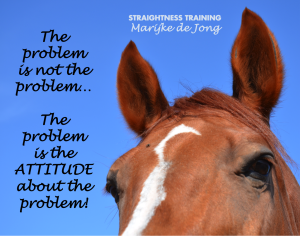
Think of someone like Nelson Mandela:
He has been violently opposed and served 27 years in prison.
What he had been put through would have broken most people.
Instead, he came out as a gentle power who changed the world forever!
Now to get to this place takes a certain amount of inner work!
So we have to ask ourselves: what else could things mean?
And use the power of meaning.
For example, what does it mean if someone is pointing a finger at you?
Look in the mirror mister or sister:
- There are three fingers poining back to you…
- You might just be talking about yourself…
Or let’s have a look at the word “moron”.
Suppose English did not come to your country and your parents named you Moron.
So every day they will say “Moron, Moron, lovely Moron”!
So the word “moron” is not causing misery.
It’s a pleasant word with a gentle sound.
But if you give it a different meaning, well, the word can cause a lot of misery.
It can destroy people’s lives.
So it’s not the word, it is our meaning and compulsive reaction to this meaning which is causing the misery.
Having put this perspective on it, we can even take it a step further:
Tip #3: What Other People Think of You is None of your Business
And what other people say to you is none of your business.

This means:
No one’s opinion about you should mean anything to you.
Whether it’s praise or criticism.
Because praise and criticism are two sides of the same coin:
- If people tell you how good and wonderful you are – and you value that – you will be floating on cloud nine.
- If people tell you otherwise – and you take that seriously – you will crash and cry, experiencing a cloud-burst.
So if we listen to praise, inevitably we will suffer criticism:
- If we enjoy and value accolades, we will be a product of other people’s opinions.
- If we dislike toxic comments and take them seriously, we will be a product of other people’s opinions.
Of course, about work and activity, we can listen to other people’s opinions for constructive feedback.
But about who we are and what we are committed to, we should not attach value to anyone’s opinion.
Again, to get to this place takes a certain amount of inner work.
It’s self-mastery: you need to work on yourself.
An inner dimension has to evolve that doesn’t depend upon what is happening around you.
If who you are is clearly established within yourself, then it doesn’t matter what people say:
- Some people say you are great.
- Some people say you are terrible.
- Some people say what you are doing is fantastic.
- Some people say it’s bad.
Both are okay, and it’s none of your business.
What IS your business, leads us top tip four:
Tip #4: Keep Your Eyes On The Road
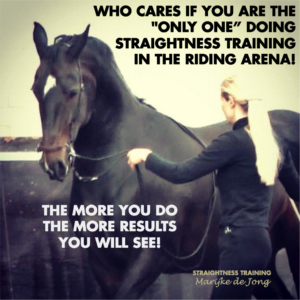
Let’s not look in the rearview mirror.
In the rearview mirror, someone may be making angry gestures, or someone may be smiling at you – it doesn’t matter.
Remember, ST is not about success or failures, it’s about making a positive difference for your horse, and creating the best possible results.
So keep your eyes are on the road.
That’s all ST is about – to strive for what truly matters.
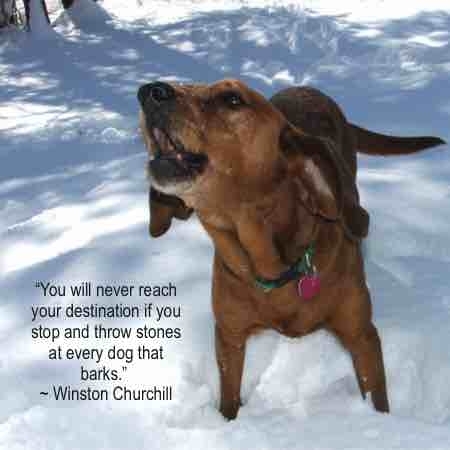
If you are striving to create what you really care for, neither praise nor criticism will matter.
And that will save you lot of misery, which brings us to tip 5:
Tip #5: Skip The Drama
Skip the drama that is created by thoughts such as “He said this” or “She did that”.
This cyclical process of thought is what is causing misery in your life.
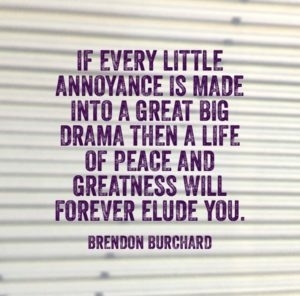
Because:
- Something that happened around you doesn’t cause misery and drama, instead:
- It’s the way you compulsively react to it which causes misery and drama.
Because what people say or don’t say is subject to various factors.
For example, if people have a low level of consciousness, they are thinking in ‘black’ and ‘white’, and ‘right’ and ‘wrong’, and ‘good’ and ‘bad’ – so they like to label you and put you in a “box”.
So they might call you a moron, or a fool, or an idiot.
Then, you can drop down to a low level of consciousness too and make a drama out of it, by saying things like:
- “It’s not fair!”
- “How can they say that!”
And this cycle of thoughts can continue for hours!
Days!
Weeks!
Years!
For a lifetime for some people!
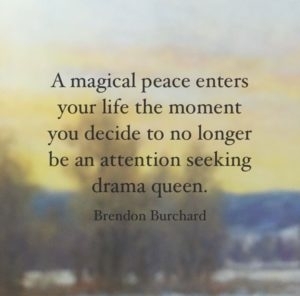
One word uttered by somebody can make some people miserable for their whole life.
But again:
Suppose you do not know the English language…
And I said:
“You moron!”
Then you might think, I am saying:
“Good morning!”
So the words don’t harm you.
They are nice words.
It’s just the way you react to it which is causing the drama.
If you did not know the language, it just wouldn’t be a problem.
The word moron is not a bullet that comes and strikes you.
It’s just a sound that I am uttering.

So skip the drama.
People on a path of purpose don’t have time for drama.
Drama in our lives is the most significant indicator that we’re not connected to our purpose and focused on meaningful goals.
People who are going onwards and upwards are at a level of consciousness where there is no black or white.
There, all the magic is in the grey.
So let’s avoid the drama, and consistently return to our calling, our creativity, our contributions that matter.
Don’t give drama any space in your life!
Tip #6: No Rent, No Room
When people criticise you, or insult you, or does something that provokes you, you might start to feel sad or angry about it.

And even hold on to that feeling, for hours, days, weeks, months, or even years.
But when it comes to resistance and resentment it’s like this:
It’s allowing someone who you don’t like to live inside your head without paying any rent!
Just simply decide:
I’m not that kind of a person!
No rent, no room.
Tip #7: Feel Compassion
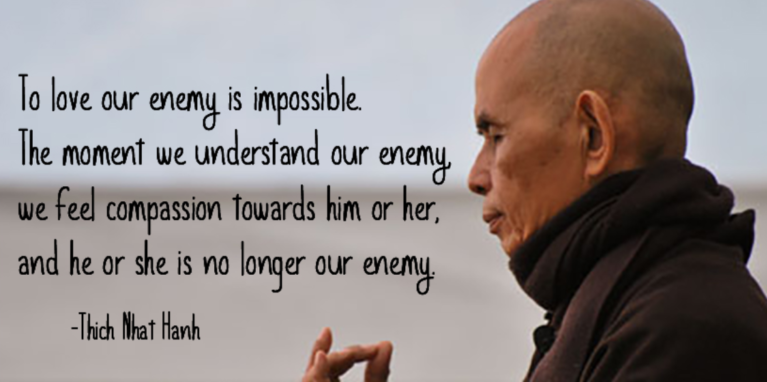
Of course, being around all those people at your yard and on the internet, it’s sometimes difficult to shake off criticism just like that.
But remember, destructive criticism only happens to people who have made a difference and an impact on the world.
Just check out any celebrity on Facebook, Instagram, Twitter, Youtube, and read the comments below their posts, pics, and vids:
It’s full of criticism, off-topic rants, and hate speech.
And the lower the level of consciousness of a “hater” – or “internet troll” as they’re also called – the more aggressive, dark, hateful, or extreme the comments.
Now it’s not about becoming insensitive to those comments.
Instead, it’s about understanding the person behind it.

Just turn your frustration into compassion, and realize:
- Haters gonna hate.
- Trolls have many “rules” about how things should be.
- They’re living on that low level of consciousness, where there’s no room for the grey and colorful dimensions of life.
- And it has been investigated, that a lot of the internet trolls feel lonely.
- They feel society has left them behind.
- And a lot of those trolls are former victims of bullying themselves.
Unfortunately for some people, their anger and their hatred are the most intense situations in their lives.
Their love and their joy are never so intense, but their negativities are.
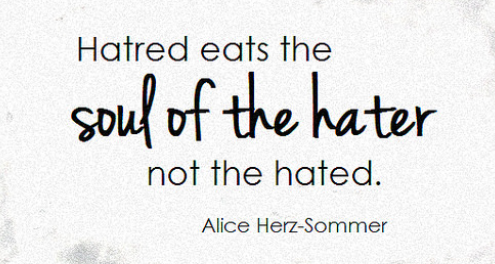
So they experience power in negative situations.
But remember the quote of Holocaust Survivor Alice Herz-Sommer (1903 – 2014)
“Hatred eats the soul of the hater, not the hated.”
Hate and anger can get you into a lot of trouble and destroy yourself.
So don’t go there, instead, feel compassion.
Tip #8: Don’t Explain
Those who insult you, they often just want attention.
Or they want to look intelligent.
Because:
- Criticism always tends to look more intelligent, than creating something.
- Destroying something always seems more powerful than constructing something.
- Also in politics, the “opposition” sounds more intelligent.
Those who are creating do not look intelligent, because:
- When we are building something, we will make many mistakes.
- We’re in the house of trial and error.
- So some things go right, some things go wrong.
But one who just criticizes and takes a stand suddenly sounds so intelligent.
However, that is a bit immature reasoning.
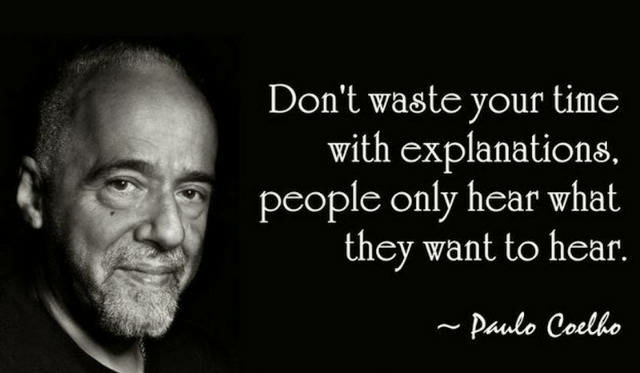
Because it takes a lot of intelligence to keep our own opinions aside, and just create what needs to be built.
Remember the time, when we’re a 3-years-old…
When our reasoning was immature…
And our level of consciousness was low and on the level of a little ‘Powergod’…
So we were denying everything and disagreeing with everyone.
When our reasoning matures, we learn to accept everything because we understand the process of life.
We are not just going by logic.
We know black, we know white, but experience that all the magic is in the grey.
We are going by the reasoning of life.
We have more life sense in us, not just logical sense.

But in case you meet the intellectual opposition, or a Powergod, or a person who lives in ‘the Absolute Truth‘ , then remember Paolo Coelho’s saying:
“Don’t waste your time with explanations.
People only want to hear what they want to hear”.
So no matter how difficult it might be:
Don’t try to convince people who are trying to convince you.
Because they don’t listen to you to understand, but they listen to reply.
Simply ignoring them could be your best tactic.
Because when they don’t get a response, when they don’t get a platform, they’ll most likely go away.
This also relates to the following tip:
Tip #9: Don’t accept the gift
Here’s a story to clarify this tip:
There once lived a great grandmaster.
Though quite old, he still was able to train any horse, no matter how difficult.
His good reputation extended far and wide throughout the land, and many students gathered to study under him.
One day an infamous young rider arrived at the village.
He was determined to be the first man to discuss and challenge the tactics, strategies, concepts, tools, and approach of the great master.
When he arrived, the young rider immediately began to throw insults at the old master.
The young rider called him:
- A fraud
- That he taught nothing new
- Horseriding is
- That he was just putting old wine in new bottles
- Filling his pockets with money by teaching
For hours, the young rider verbally assaulted him with every insult and every curse known to mankind.
But the old grandmaster was not upset with these insults.
He merely stood there motionless and calm.
Finally, the young rider exhausted himself.
Knowing he was “defeated“, he left feeling shamed.
Somewhat disappointed that he did not argue with and defend himself from the young rider, the students gathered around the old grandmaster and questioned him:
“How could you endure such an indignity?”
and
“How did you drive him away?”
The grandmaster replied with a question:
“If someone comes to give you a gift, and you do not take and accept it:
To whom does the gift belong?”

So here’s how it works:
- If someone comes to insult you, or is angry with you,
- And you do not feel insulted
- Then the insults and anger fall back on the bringer of this ‘gift’.
Then this person is the only one who becomes unhappy.
All he has done is hurt himself.
So as already said in the previous tips:
Why be angry about this person?
Just feel sorry and feel pity for him.
And back to this, the bottom-line is:
You always have a choice!
- You can accept gifts
- or not accept gifts
As simple as that!
Tip #10: It’s Your Party
Whatever internet account you have – Facebook, Instagram, Youtube, Twitter, a blog, a website, whatever – see it also as your house.

Your house, where you organize your party!
Because a party is a great place to interact and engage with like-minded people who are interested in your party, and in your path.
But when people use your party:
- to stand on their own soapbox
- to proclaim their own gospel
- to win souls by persuading others of ‘their truth‘ and their ‘one-and-only way‘
- or to reject or insult you
- or todeliberately destroy your party…
Well…
Here’s what to do:
- Delete their promotional, or harassing comment.
And if that won’t help
- Remove and ban them from your party.
Tip #11: Do what makes you happy
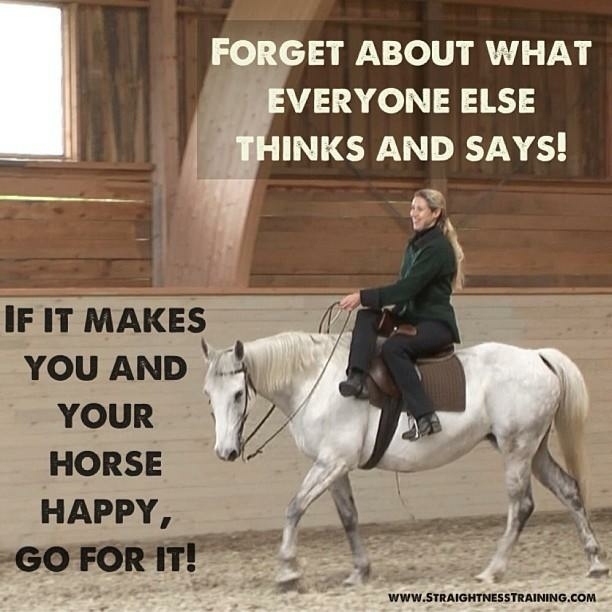
Tip #12: Together is better
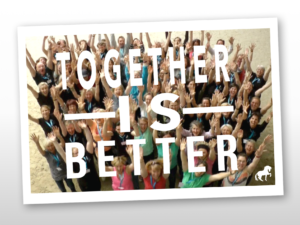
Now if you’re the only one in the riding arena…
Or at the barn…
Or in your home-town…
Or even in your country!
Then join the ST Community with like-minded STudents from all over the world!
And in the online ST Academy, our students give so much time to the improvement of themselves that they don’t have time to criticize others.
Thanks to the internet we can do great things together, and support each other!
And we’d love to have you join us!

